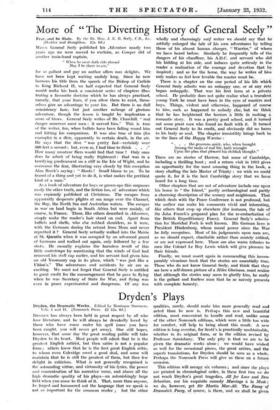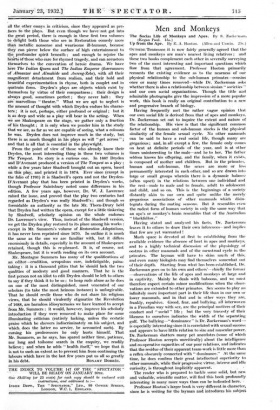Dryden 's Plays
Dryden, the Dramatic Works. Edited by Montague Summers. Vols. I and 11. (Nonesuch Press. £2 Its. ed.) DnyoEs has always been held in great respect by all who love literature, and he will always be devotedly loved by those who have come under his spell (once you have been caught, you will never get away). One still hopes, however, that some day the great reading public will take Dr•den to. its heart. Most people will admit that he is the greatest English satirist, but then satire is not a popular form : others know that he is the first great English critic, to whom even Coleridge owed a good deal, and some will maintain that he is still the greatest of them, but then few delight in criticism. What is not generally recognized is the astounding virtue, and virtuosity of his lyrics, the power and concentration of his narrative verse, and above all the high dramatic quality of his plays—an astonishingly large field when you come to think of it. That, more than anyone, be forged and hammered out the language that we speak is not so important for the common reader ; but the other qualities, surely, should make him more generally read and acted than lie now is. Perhaps this new and beautiful edition, most convenient to handle and read, unlike some of the other Nonesuch editions, which were a little too wide for comfort, will -help to bring about this result. A new edition is long overdue, for Scott's is practically unobtainable, whether in its original form, or in the edition revised by Professor Saintsbury. The only pity is that we are to be given the dramatic works alone ; we would have wished as well for the occasional pieces, the great satires, and the superb translations, for Dryden Should be seen as a whole. Perhaps the Nonesuch Press will give us these on a future occasion. • This edition will occupy six volumes ; and since the plays are printed in chrOnological order, in these first two we do not reach Dryden's great tragedies, AU for Lore and Don Sebastian, nor his exquisite comedy Marriage a /a Mode ; we do, -however, get Sir Martin Mar-All. The Essay • of Dramatic!: Poesy, of course, is there, and we shall be given all the. other essays in criticism, since they appeared as pre- faces to the plays. But even though we have not got into the great period, there is enough in these first two volumes to delight both those who see in Restoration comedy more than metallic nonsense and wearisome ill-humour, because they can pierce below the surface of high entertainment to th9. profounder spirit beneath ; and enough to rejoice the hearts of those who care for rhymed tragedy, and can accustom themselves to the convention of heroic drama. We have here The Indian Queen and The Indian Emperor (forerunners of Almanzor and Almahide and Aureng-Zehe), with all their magnificent detachment from realism, and their bold and beautiful experimentation in rhyme, both in couplet and in quatrain form. Dryden's plays are objects which exist by themselves by virtue of their compactness ; their design is always good, sometimes perfect ; they never halt : they are marvellous " theatre." What we are apt to neglect is the amount of thought with which Dryden endues his charac- ters ; it is not, perhaps, either profound or original ; but it is as deep and wide as a play will bear in the acting. When we see Shakespeare on the stage, we gather only a fraction of his thought ; it is only when we ponder him in the study that we see, as far as we are capable of seeing, what a colossus he was. Dryden does not improve much in the study, but there is as much thought in his plays as will "get across " ; and that is all that is essential in the playwright.
From the point of view of those who already know their Dryden, the most interesting thing in these two volumes is The Tempest. Its story is a curious one. In 1667 Dryden and'D'Avenant produced a version of The Tempest as a play ; while a few years later Shadwell brought out an opera, based On this play, and printed it in 1674. Ever since (except in the folio of 1701) it is Shadwell's opera and not the Dryden- D'Avenant play that has been printed in Dryden's works, though Professor Saintsbury noted some differences in his edition. A few years ago, however, Dr. W. J. Lawrence raised the issue, and proved that the play two centuries had regarded as Dryden's was really Shadwell's ; and though so formidable an authority as the late Mr. Thorn-Drury held that Dryden had written the opera, except for a little tinkering by Shadwell, scholarly opinion on the whole endorses Dr. Lawrence's view. Thus, instead of the Shadwell version, we get the Dryden play restored to its place among his works : except in Mr. Summers's volume of Restoration Adaptations, it has never been reprinted since 1670. In outline it is much the same as the one we arc familiar with, but it differs enormously in details, especially in the amount of Shakespeare retained, though this is re-phrased. It is, of course, not Shakespeare, but it is worth reading on its own account.
Mr. Montague Summers has many of the qualifications of an editor—erudition, scrupulous care, indefatigable, pains- taking': it is a thousand pities that he 'should lack the two qualities of modesty and good manners. That he is the first person not an idiot to edit Dryden should be left to others to say if they think it to be so ; to heap rude abuse as he does on one of the most distinguished, most venerated of our scholars (to take the most heinous instance) is unforgivable. That he should revile those who do not share his religious views, that he should virulently stigmatize the Revolution of 1688, are harmless idiosyncrasies we have learned to accept from Mr. Summers : it would, however, improve his scholarly introdnction if they were removed to make place for some illuminating criticism (entirely lacking, unless the ecstatic praise which he showers indiscriminately on his subject, and which does the latter no service, be accounted such). By cursing his predecessors he only hurts himself. That Mr. Summers, as he says, has spared neither time, patience, nor long and toilsome search in the enquiry, we readily believe ; and when he adds " health itself," we hope that it is not to Such an extent as to prevent him from continuing the labours which have in the last few years put us all so greatly





































 Previous page
Previous page